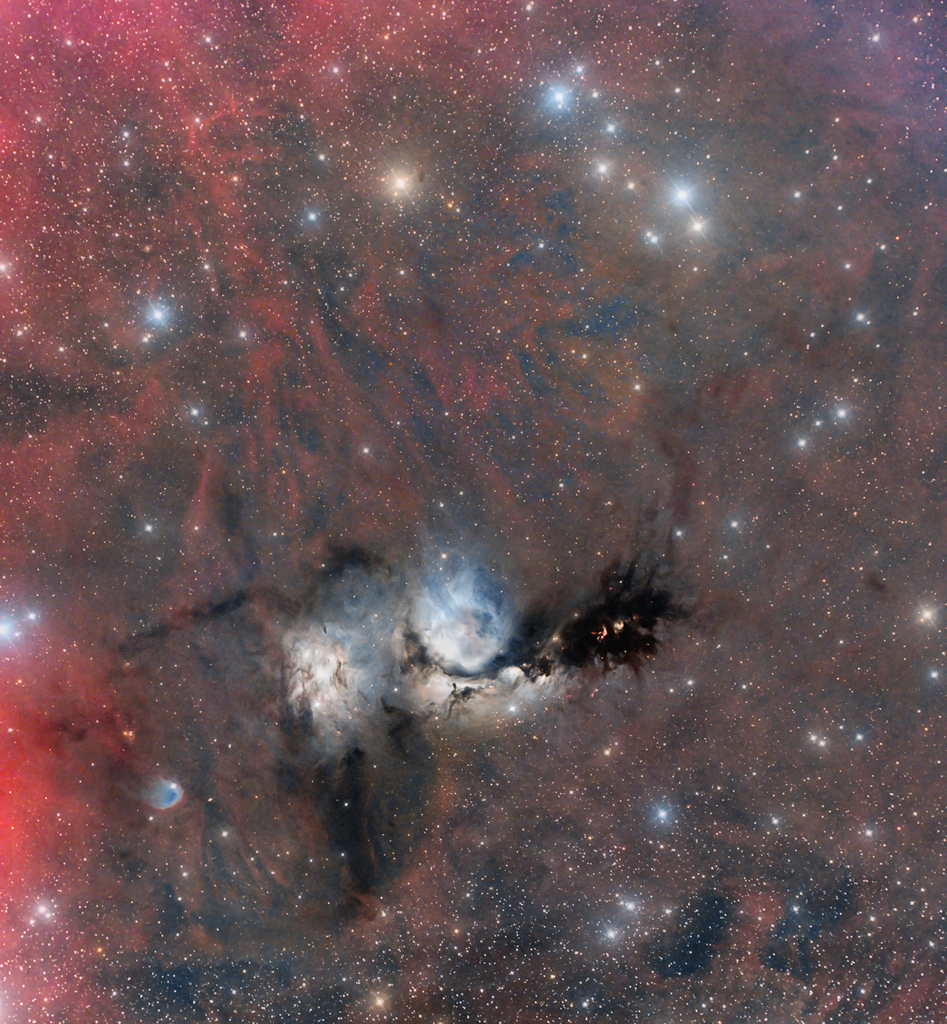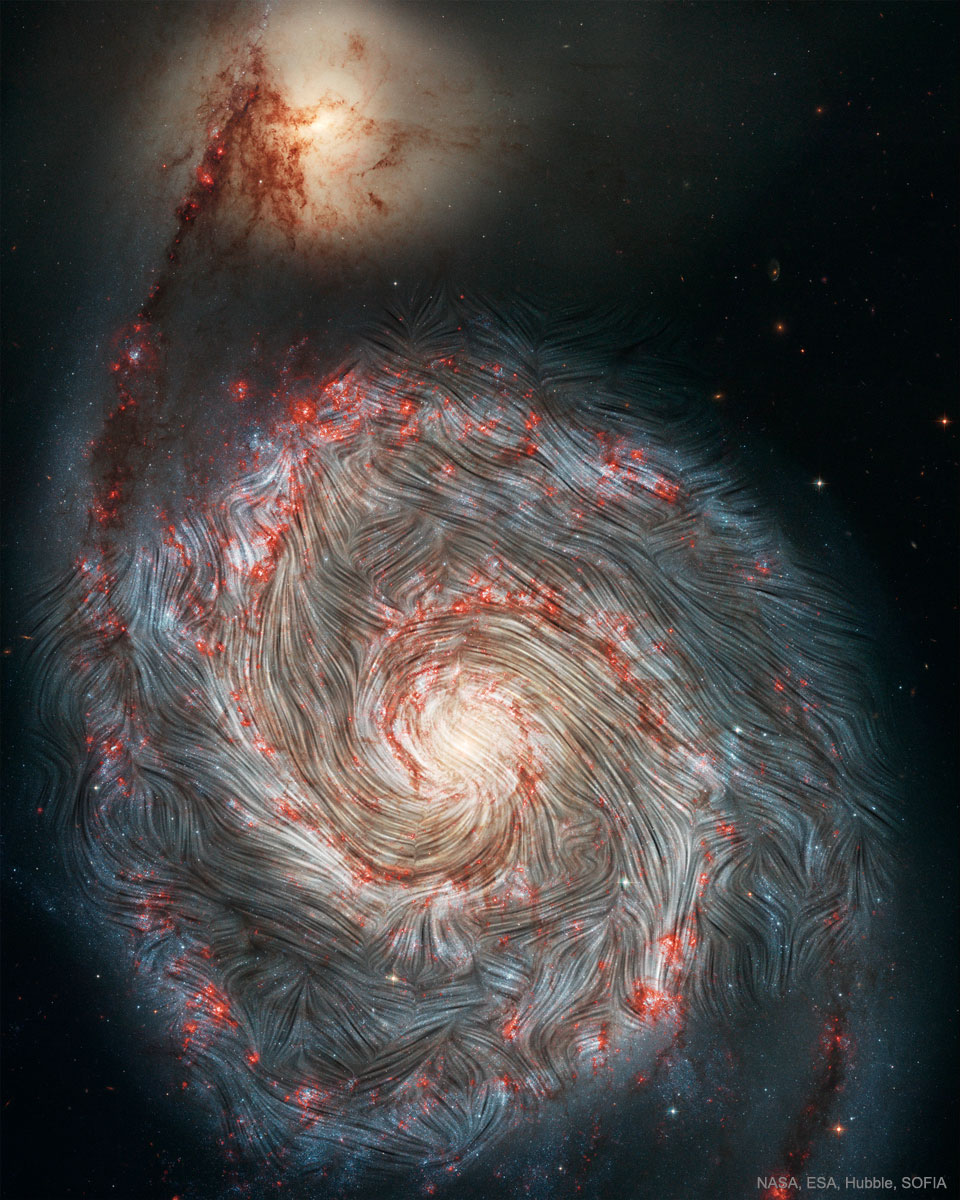mick will perform Rat Race the horn version and his own arrangements and maybe a Coxcone Dodd Ska favorite.

An expanse of cosmic dust, stars and nebulae along the plane of our Milky Way galaxy form a beautiful ring in this projected all-sky view. The creative panorama covers the entire galaxy visible from planet Earth, an ambitious 360 degree mosaic that took two years to complete. Northern hemisphere sites in western China and southern hemisphere sites in New Zealand were used to collect the image data. Like a glowing jewel set in the milky ring, the bulge of the galactic center, is at the very top. Bright planet Jupiter is the beacon just above the central bulge and left of red giant star Antares. Along the plane and almost 180 degrees from the galactic center, at the bottom of the ring is the area around Orion, denizen of the northern hemisphere’s evening winter skies. In this projection the ring of the Milky Way encompasses two notable galaxies in southern skies, the large and small Magellanic clouds.

Made from 10 light frames by Starry Landscape Stacker 1.8.0. Algorithm: Mean Min Hor Star Dupe
Eberhard Weber (born 22 January 1940, in Stuttgart, Germany) is a German double bassist and composer. As a bass player, he is known for his highly distinctive tone and phrasing. Weber’s compositions blend chamber jazz, European classical music, minimalism and ambient music, and are regarded as characteristic examples of the ECM Records sound.
Weber began recording in the early 1960s, and released The Colours of Chloë (ECM 1042), his first record under his own name, in 1973. In addition to his career as a musician, he also worked for many years as a television and theater director. He has designed an electric-acoustic bass with an additional string tuned to C.
Weber’s music, often in a melancholic tone, frequently utilizes ostinatos, yet is highly organized in its colouring and attention to detail. He was an early proponent of the solid-body electric double bass, which he has played regularly since the early 1970s.
see full post...Samuel Cook (January 22, 1931 – December 11, 1964), known professionally as Sam Cooke, was an American singer, songwriter, and entrepreneur. He was also influential as a composer and producer, and is commonly known as the King of Soul for his distinctive vocals and significance in popular music.
Cooke was born in Mississippi and moved to Chicago with his family at an early age. He began singing as a child and joined the Soul Stirrers before going solo and scoring a string of hit songs including “You Send Me“, “A Change Is Gonna Come“, “Cupid“, “Wonderful World“, “Chain Gang“, “Twistin’ the Night Away“, and “Bring It On Home to Me“. In 1964, Cooke was shot and killed by the manager of a motel in Los Angeles. After an inquest and investigation, the courts ruled Cooke’s death to be a justifiable homicide; his family has since questioned the circumstances of his death.
Cooke’s pioneering contributions to soul music contributed to the rise of Aretha Franklin, Bobby Womack, Al Green, Curtis Mayfield, Stevie Wonder, Marvin Gaye, and Billy Preston, and popularized the work of Otis Redding and James Brown. AllMusic biographer Bruce Eder wrote that Cooke was “the inventor of soul music”, and possessed “an incredible natural singing voice and a smooth, effortless delivery that has never been surpassed”.
Cooke was born Samuel Cook in Clarksdale, Mississippi, in 1931 (he added the “e” to his last name in 1957 to signify a new start to his life). He was the fifth of eight children of the Rev. Charles Cook, a minister in the Church of Christ (Holiness), and his wife, Annie Mae. One of his younger brothers, L.C. (1932–2017), later became a member of the doo-wop band Johnny Keyes and the Magnificents.
see full post...James Louis Johnson (January 22, 1924 – February 4, 2001) was an American jazz trombonist, composer and arranger. Johnson was one of the earliest trombonists to embrace bebop.
After studying the piano beginning at age 9, Johnson decided to play trombone at the age of 14. In 1941, he began his professional career with Clarence Love, and then played with Snookum Russell in 1942. In Russell’s band, he met the trumpeter Fats Navarro, who influenced him to play in the style of the tenor saxophonist Lester Young. Johnson played in Benny Carter‘s orchestra between 1942 and 1945, and made his first recordings in 1943 under Carter’s leadership, recording his first solo (on Love for Sale) in October 1943. In 1944, he took part in the first Jazz at the Philharmonicconcert, presented in Los Angeles and organized by Norman Granz. In 1945 he joined the big band of Count Basie, touring and recording with him until 1946.
see full post...Blind Willie Johnson (January 25, 1897 – September 18, 1945) was an American gospel blues singer, guitarist and evangelist. His landmark recordings completed between 1927 and 1930—thirty songs in total—display a combination of powerful “chest voice” singing, slide guitar skills, and originality that has influenced generations of musicians. Even though Johnson’s records sold well, as a street performer and preacher, he had little wealth in his lifetime. His life was poorly documented, but over time, music historians such as Samuel Charters have uncovered more about Johnson and his five recording sessions.
A revival of interest in Johnson’s music began in the 1960s, following his inclusion on Harry Smith‘s Anthology of American Folk Music, and by the efforts of the blues guitarist Reverend Gary Davis. Johnson’s work has become more accessible through compilation albums such as American Epic: The Best of Blind Willie Johnson and the Charters compilations. As a result, Johnson is credited as one of the most influential practitioners of the blues, and his slide guitar playing, particularly on his hymn “Dark Was the Night, Cold Was the Ground“, is highly acclaimed. Other recordings by Johnson include “Jesus Make Up My Dying Bed“, “It’s Nobody’s Fault but Mine“, and “John the Revelator“.
Johnson was born on January 25, 1897, in Pendleton, Texas, a small town near Temple, Texas, to sharecropper George Johnson (also identified as Willie Johnson Sr.) and his wife, Mary Fields, who died in 1901. His family, which according to the blues historian Steven Calt included at least one younger brother named Carl, moved to the agriculturally rich community of Marlin, where Johnson spent most of his childhood.
see full post...The alboreá or albolá is a flamenco palo which is sung only in Gypsy marriage rites, and many Gypsies refuse to sing it outside this context or in the presence of non-Gypsies. It is linked to the Gypsy romance, and derives many lyrics from it.
The rhythm and guitar accompaniment is identical with the soleá. The lyrics are usually formed stanzas with four 6-syllable lines.
see full post...Interstellar dust clouds and glowing nebulae abound in the fertile constellation of Orion. One of the brightest, M78, is centered in this colorful, wide field view, covering an area north of Orion’s belt. At a distance of about 1,500 light-years, the bluish reflection nebula is around 5 light-years across. Its tint is due to dust preferentially reflecting the blue light of hot, young stars. Reflection nebula NGC 2071 is just to the left of M78. Flecks of emission from Herbig-Haro objects, energetic jets from stars in the process of formation, stand out against the dark dust lanes. The exposure also brings out the region’s fainter, pervasive reddish glow of atomic hydrogen gas.

Steven Dirk Gilmore (born January 21, 1943, Trenton, New Jersey) is an American jazz double-bassist.
Gilmore picked up bass when he was twelve years old and played locally in Philadelphia as a teenager. At age 17 he enrolled at the Advanced School of Contemporary Music, run by Oscar Peterson, and later in the 1960s played with Ira Sullivan and the Baker’s Dozen Big Band. He joined Flip Phillips‘s group in 1967 and remained with Phillips until 1971, after which he worked with Al Cohn and Zoot Sims, Mose Allison, The Thad Jones/Mel Lewis Orchestra, Phil Woods, Richie Cole, and the National Jazz Ensemble. In the 1980s he played with John Coates, Meredith D’Ambrosio, Dave Frishberg, Hal Galper, Tom Harrell, and Toshiko Akiyoshi, as well as with Woods; he and Woods would remain collaborators into the 1990s. In 1988 he began working with Dave Liebman, with whom he would work intermittently through the late 1990s. Other associations in the 1990s included Carol Sloane, Susannah McCorkle, Bill Charlap, and Jim Hall.
https://www.youtube.com/watch?v=DYM17JZidKk&t=629s
see full post...Richard Pierce Havens (January 21, 1941 – April 22, 2013) was an American singer-songwriter and guitarist. His music encompassed elements of folk, soul, and rhythm and blues. He had an intense and rhythmic guitar style (often in open tunings), and played soulful covers of pop and folk songs. He was the opening act at Woodstock.
Born in Bedford–Stuyvesant, Brooklyn, New York City, New York, Havens was the oldest of nine children. He was of Native American (Blackfoot) descent on his father’s side and of the British West Indies on his mother’s. His grandfather was Blackfoot of the Montana/South Dakota area.
Havens’s grandfather and great-uncle joined Buffalo Bill’s Wild West Show, moved to New York City thereafter, and settled on the Shinnecock Reservation on Long Island. Havens’s grandfather married, then moved to Brooklyn.
see full post...Fird Eaglin Jr. (January 21, 1936 or 1937 – February 18, 2009), known as Snooks Eaglin, was an American guitarist and singer based in New Orleans. In his early years he was sometimes credited under other names, including Blind Snooks Eaglin, “Lil” Snook, Ford Eaglin, Blind Guitar Ferd.
His vocal style was reminiscent of that of Ray Charles; in the 1950s, when he was in his late teens, he sometimes billed himself as “Little Ray Charles”. He played a wide range of styles of music within the same concert, album, or even song: blues, rock and roll, jazz, country, and Latin. In his early years, he also played acoustic blues.
His ability to play a wide range of songs and make them his own earned him the nickname “The Human Jukebox.” Eaglin claimed in interviews that his musical repertoire included some 2,500 songs.
At live shows, he usually did not prepare set lists and was unpredictable, even to his bandmates. He played songs that came to him on stage, and he also took requests from the audience.
see full post...Robert “Juice” Wilson (January 21, 1904 – May 22, 1993) was an American jazz violinist.
Wilson grew up an orphan and was raised by his uncle from age three in Chicago. He began playing drums in the Chicago Militia Boys Band, then switched to violin at age eight. By the age of twelve he was already playing with Jimmy Wade, and at 14 he performed with Freddie Keppard. He worked on steamboats on the Great Lakes and did extended residencies with Jimmy Harrison in Ohio. Early in the 1920s he worked in Erie, Pennsylvania with Hersal Brassfield, then moved to Buffalo, New York to play with Eugene Primus as well as the Buffalo Junior Symphony Orchestra.
In 1928, Wilson moved to New York City and played with Lloyd Scott at the Savoy Ballroom. At the end of the decade he toured Europe with Noble Sissle, and decided to remain there. He worked first in the Netherlands with Ed Swayzee, Leon Abbey, the Utica Jubilee Singers, the Louis Douglass Revue, Little Mike McKendrick’s International Band, and Tom Chase. He made trips to Spainand North Africa before settling in Malta, where he became a local star. He worked there through much of the 1940s and 1950s as a multi-instrumentalist, and made further tours around the Mediterranean before coming back to the United States in the 1960s. He died peacefully in 1993.
see full post...Our face-on view of the Whirlpool Galaxy (M51) allows a spectacularly clear view of the spiral wave pattern in a disk-shaped galaxy. When observed with a radio telescope, the magnetic field appears to trace the arms’ curvature. However, with NASA’s flying Stratospheric Observatory for Infrared Astronomy (SOFIA) observatory, the magnetic field at the outer edge of M51’s disk appears to weave across the arms instead. Magnetic fields are inferred by grains of dust aligning in one direction and acting like polaroid glasses on infrared light. In the featured image, the field orientations determined from this polarized light are algorithmically connected, creating streamlines. Possibly the gravitational tug of the companion galaxy, at the top of the frame, on the dusty gas of the reddish star-forming regions, visible in the Hubble Space Telescope image, enhances turbulence — stirring the dust and lines to produce the unexpected field pattern of the outer arms.

January 20th 1960.
Jeff “Tain” Watts is one of the most in demand jazz drummers in the world today. Jeff Watts majored in classical percussion at Pittsburgh’s Duquesne University, where he was primarily a timpanist, followed by enrollment at the Berklee School of Music, where he pursued jazz studies alongside such talented players as Branford Marsalis, Kevin Eubanks, Greg Osby, Aimee Mann, Steve Vai and Marvin “Smitty” Smith.
Jeff joined the Wynton Marsalis Quartet in 1981 and proceeded to win three Grammy Awards with the ensemble. Watts left Wynton Marsalis in 1988. After working with George Benson, Harry Connick. Jr. and McCoy Tyner, he joined the Branford Marsalis Quartet in 1989.
Jeff has worked in the film and television industry as both a musician on the Tonight Show with Jay Leno and as an actor, Rhythm Jones in Spike Lee’s “Mo Better Blues”. Jeff joined Kenny Garrett’s band after returning to New York in 1995 after three years in LA on the Tonight Show. Watts also continued to record and tour with Branford Marsalis as well as Danilo Perez, Michael Brecker, Betty Carter, Kenny Kirkland, Courtney Pine, Geri Allen, Alice Coltrane, Greg Osby, Steve Coleman, Gonzalo Rubalcaba, and Ravi Coltrane.
https://www.youtube.com/watch?v=LkjXMYvYvZw
see full post...